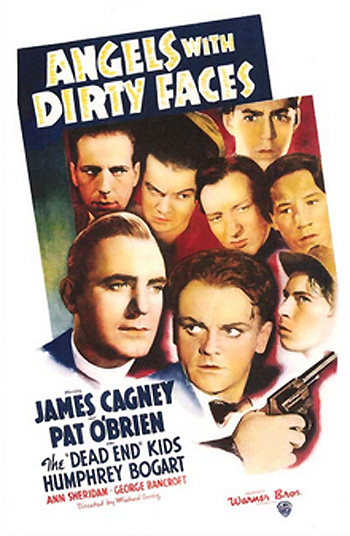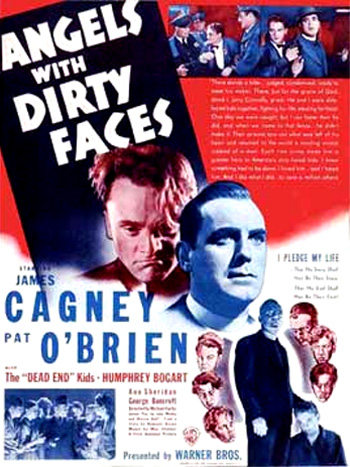Plot Synopsis (continued)
 Laury,
who has fallen in love with Rocky, can't understand why Father Jerry
is hounding and threatening Rocky. Arguing that Rocky's criminal
behavior is not his fault, she believes in Rocky's innate goodness
- it was reform school that made him a criminal. Father Jerry responds
with compassion and understanding: Laury,
who has fallen in love with Rocky, can't understand why Father Jerry
is hounding and threatening Rocky. Arguing that Rocky's criminal
behavior is not his fault, she believes in Rocky's innate goodness
- it was reform school that made him a criminal. Father Jerry responds
with compassion and understanding:
I've loved him since we were kids 6 years old - we
worked together, fought together, stole together. Oh, I'm not blaming
Rocky for what he is today. But for the grace of God, there walk
I. I'd do anything for him, Laury, anything in the world to help
him. I'd give my life if I thought it would do any good, but it
wouldn't.
The reform campaign catches fire in the city, and countless
thousands of citizens support the effort. Outspoken Jerry is outraged
and tells his radio audience at a mass meeting:
This very afternoon, I was approached with a sugar-coated
proposition - a bribe offered me by this corrupt officialdom -
$100,000 for the building and equipment of a recreation center
in my parish - if I would agree to refrain from further attacks...But
the building of an isolated playground to shield my boys from crime
is not rooting out the crime itself. We must rid ourselves of the
criminal parasites that feed on us. We must wipe out those we have
ignorantly elected and those who control and manipulate this diseased
officialdom behind locked doors...
On the eve of a grand jury investigation into the corruption,
Rocky's crooked, double-crossing business associates, Frazier and
Keefer, plot to assassinate Jerry. To protect his childhood friend
and get revenge at the same time, Rocky murders them both at the
nightclub (the first of three times in cinematic history that Bogart
dies a screen death at the hands of Cagney). Moments later, an army
of police arrive at the scene for a wild chase. They trap him and
engage him in a gun shootout in an abandoned warehouse, filling it
with tear gas. Jerry is permitted to enter the building and speak
to Rocky, but Rocky doesn't want to see him:
What are you doing up here? Go on, get out of here,
beat it!...What's the matter with you? Want to get your skull full
of lead? Get out of here.
Rocky wants to hold off the police and die fighting
in a last stand, but realizes his revolver is empty of bullets. Rocky
agrees to come out peacefully with Jerry, but then turns on him and
uses him as a shield. Rocky pushes Jerry down when they emerge on
the street and makes one last attempt to flee on foot. Rocky is finally
apprehended and arrested when he is wounded in the leg. One of the
cops marvels at Rocky's empty gun:
Cop: Empty!
Rocky (snarling with an evil grin): So's your thick skull, copper.
Rocky is condemned in the newspapers: "Identify
Rocky as Killer." He continues to remain a hero to the street
kids, enthralled by his bravado. Rocky is swiftly tried for murder,
convicted, and sentenced to die in the electric chair. On the day
of his execution as he sits on death row, a prison guard taunts Rocky:
"I'm going to tell the electrician to give it to you slow and
easy, wise guy."
Rocky is defiant, promising to spit in the eye of his executioners.
In the memorable final moments of the film, shortly
before the hour of his death, Jerry visits Rocky in his cell for
a final ten minutes and asks for a courageous favor. Rocky downplays
his impending death, and makes macho jokes about his electrocution,
practicing his last words:
It's like sitting in a barber chair. They're going
to ask me, 'You got anything to say?' and I say, 'Sure. Give me
a haircut, a shave and a massage - one of those nice new electric
massages.'
Jerry asks if he is afraid. Rocky responds fearlessly:
You know Jerry, I think in order to be afraid, you've
got to have a heart. I don't think I got one. I got it cut out
of me a long time ago.
Jerry asks one last favor - for Rocky to have a heart:
Jerry: Suppose I asked you to have the heart...to
be scared...Suppose at the last minute the guards dragged you out
here screaming for mercy. Suppose you went to the chair yellow.
Rocky: Yellow - Hey! What's the matter with you Jerry?
Jerry wants Rocky to behave in a way so that the neighborhood
kids will not admire him and revere him as a role model or martyr,
following in his misguided footsteps. Jerry asks that Rocky make
a really heroic action and show a special kind of courage:
This is a different kind of courage, Rocky. The kind
that's well, that's born in heaven. Well, not the courage of heroics
or bravado. The kind that you and I and God know about...I want
you to let them down. You see, you've been a hero to these kids,
and hundreds of others, all through your life - and now you're
gonna be a glorified hero in death, and I want to prevent that,
Rocky. They've got to despise your memory. They've got to be ashamed
of you.
Rocky is reluctant to humble himself and show fear
in the death chamber. He refuses to be a cringing coward pretending
to be 'yellow':
You asking me to pull an act, turn yellow, so those
kids will think I'm no good...You ask me to throw away the only
thing I've got left...You ask me to crawl on my belly - the last
thing I do in life...Nothing doing. You're asking too much...You
want to help those kids, you got to think about some other way.
 In one of the most tautly directed, unforgettable,
harrowing sequences of any film in the 1930s, Rocky is taken away
for his last walk. The scene is bathed in dark suggestive, oppressive
shadows, and the musical score (by Max Steiner) resembles a plodding,
relentless death march as he walks to his death. Rocky asks that
Jerry accompany him "going down the last mile." Still cocky
and glaring with hatred, he snarls at and punches the sarcastic prison
guard - it appears that Rocky will be stoic to the end. Other prisoners
on death row stare at the doomed man, bidding him goodbye through
their jail cells. He shakes Jerry's hand goodbye. In one of the most tautly directed, unforgettable,
harrowing sequences of any film in the 1930s, Rocky is taken away
for his last walk. The scene is bathed in dark suggestive, oppressive
shadows, and the musical score (by Max Steiner) resembles a plodding,
relentless death march as he walks to his death. Rocky asks that
Jerry accompany him "going down the last mile." Still cocky
and glaring with hatred, he snarls at and punches the sarcastic prison
guard - it appears that Rocky will be stoic to the end. Other prisoners
on death row stare at the doomed man, bidding him goodbye through
their jail cells. He shakes Jerry's hand goodbye.
In the final moments before his execution as he enters
the death chamber, he breaks down. [It is unclear whether or not
his true nature or motives are revealed - is he pretending or not?].
Rocky is transformed into a screaming, snivelling, cowering coward
begging not to be killed. Awful, heart-rending screams of pathetic
cowardice are heard. Seen only in large shadows projected on the
wall, Rocky's cowardice is never fully revealed:
Oh, I don't wanna die! Oh, please. I don't wanna
die! Oh, please. Don't let me burn. Oh, please. Let go of me. Please...
Rocky's climactic cowardice brings tears to Father
Connolly's eyes. His yellow-ness in the face of the electric chair
will kill the kids' unhealthy adoration. Grateful love fills Jerry's
face - his prayers are answered.
The newspaper headline announces that Rocky turned
yellow during his cowardly execution:
ROCKY DIES YELLOW KILLER COWARD AT END.
In the presence of all the gang members, one of them
reads aloud the newspaper account of Rocky's unheroic death, but
the boys don't want to believe that it's true:
'At the fatal stroke of 11 pm, Rocky was led through
the little green door of death. No sooner had he entered the death
chamber than he tore himself from the guard's grasp and flung himself
on the floor, screaming for mercy. Then, as they dragged him to
the electric chair, he clawed wildly at the concrete floor with
agonized shrieks. In contrast to his former heroics, Rocky Sullivan
died a coward.'
Thinking that the newspaper reports are a lie, they
ask Father Connelly, who witnessed the execution, to tell them what
happened:
Did Rocky die as they said, like a yellow rat?
Remembering the boyhood crime that separated Rocky
and him, a crime that made a permanent mark on their futures, Jerry
delivers the last line of the film to the kids, as they mutely walk
off with him up the stairs and to the church:
It's true, boys. Every word of it. He died like they
said. All right, fellas. Let's go and say a prayer for a boy who
couldn't run as fast as I could.
|